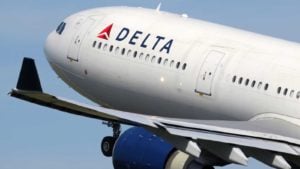Don’t Rush to Buy Delta Stock, There’s Plenty of Time to Bottom Fish
It's too soon to buy DAL stock as the airline sector doesn't look likely to make a rebound anytime soon
The novel coronavirus pandemic has hammered the airline sector, leaving companies like Delta Airlines (NYSE:DAL) struggling to find a way forward. But in recent weeks, positive news regarding progress on a coronavirus vaccine encouraged bottom feeders to scoop up DAL stock on this dip.

Delta’s rally has been nothing short of impressive — share prices have gained nearly 20% since mid-May.
But DAL still trades more than 60% off of February prices, begging the question, should you chase this rally?
The Case for DAL Stock
While the state of airline travel has been worrying over the past few weeks, there have been some glimmers of hope suggesting a sooner-than-expected recovery.
Positive vaccine news is, above all, the largest tailwind for the sector. In the absence of a vaccine, many people will be unwilling to travel and new coronavirus-related measures will make it difficult for airlines to turn a profit.
But promising data from Moderna (NASDAQ:MRNA) and other biotechs working on possible vaccine candidates has no-doubt been a boon for DAL stock.
More importantly, is the fact that travelers are starting to return to air travel in the absence of a vaccine. Data from the Transport Security Agency shows that the number of people passing through their security checkpoints is steadily rising. On May 13, passenger traffic had grown 26% from the previous week.
The Bad News for Delta
Unfortunately, the good news ends there. While passenger numbers according to the TSA are on the rise, it’s important to consider that they’re still less than 10% of the volumes seen in 2019.
While passengers returning to air travel is a good thing, it’s worth noting that airlines will continue to struggle until their planes are full.
Social distancing makes operating a profitable airline nearly impossible. Just trying to enforce rules like mandatory masks and no large gatherings during boarding and deplaning takes time to implement.
But worse still is the fact that many are calling for planes to leave the middle seat empty in order to give passengers more space. Doing so would pose a significant problem for carriers like Delta, who are trying to claw back any last profits they can to dig themselves out of this hole.
Delta Confirms Long-Timeline for Return to Travel
There have been a lot of estimates floating around for when travel is expected to return to pre-pandemic levels. Each one is dependent on a major unknown — the trajectory of the coronavirus and the likelihood of a second wave in Autumn.
But Delta offered a telling sign of its own expectations earlier the week when it retired its entire fleet of Boeing 777 planes. Delta CEO Ed Bastain said the retirement will help stop some of the bleeding as the firm hemorrhages $50 billion in cash each day.
The news suggests Delta isn’t banking on passengers taking international trips in the near future. For the second quarter Delta forecast international flights to be down 90%, but beyond that it’s anyone’s guess.
Because coronavirus has impacted countries around the world in different ways, international travel will likely take the most time to resume as countries open and shut their borders in response to new virus outbreaks.
Leisure travelers are likely to stay closer to home until the pandemic is seen as largely under control. Some families will probably cancel their summer holiday plans altogether as the economic downturn has caused a great deal of financial uncertainty.
The Bottom Line for Delta
To be sure, Delta isn’t the worst pick in the airline sector — but it also isn’t the best. For now, Southwest (NYSE:LUV) looks best positioned to capitalize on a return to domestic travel. The airline’s strong financials make it the most likely to weather the storm unscathed and potentially benefit from peers going bust.
But while Delta is in a better financial position than American Airlines (NYSE:AAL), it’s still carrying around a hefty debt pile and has taken more government bailout money than any of its competitors.
Delta is an average pick in an extremely risky sector, and that’s why it’s worth staying on the sidelines. In my view, investors have plenty of time to go bottom fishing in the airline industry because it will remain depressed for a long time to come.
As of this writing Laura Hoy did not hold a position in any of the aforementioned securities.